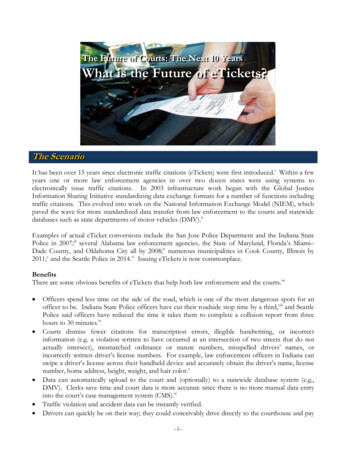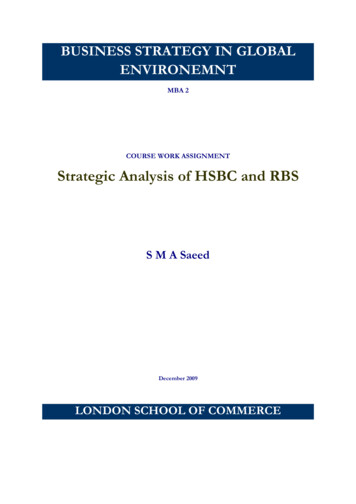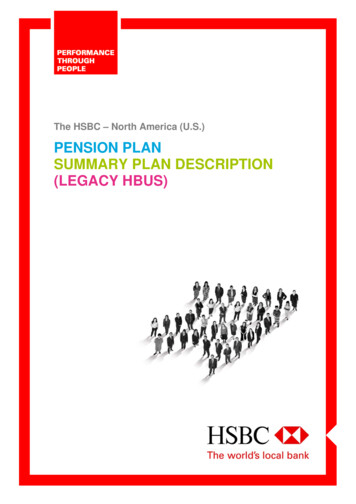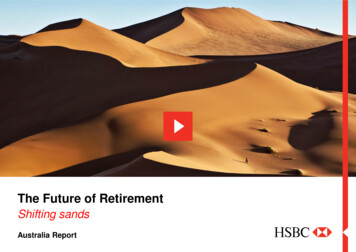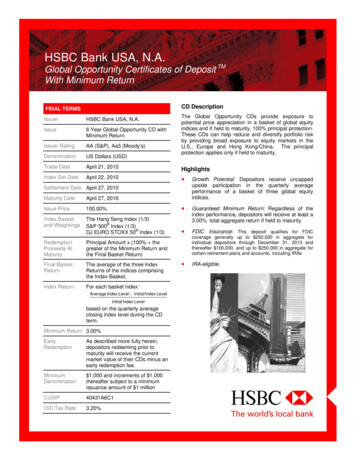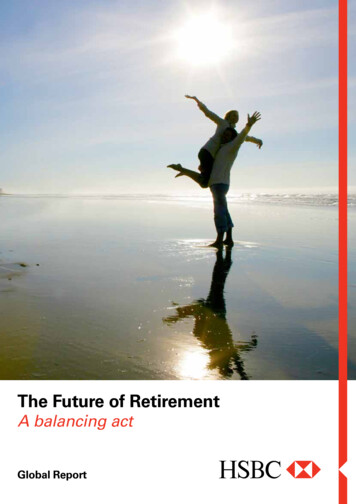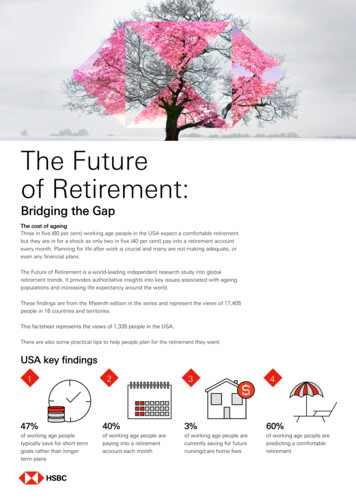
Transcription
The Future of Retirement The cost of ageingThe Futureof Retirement:Bridging the GapThe cost of ageingThree in five (60 per cent) working age people in the USA expect a comfortable retirementbut they are in for a shock as only two in five (40 per cent) pay into a retirement accountevery month. Planning for life after work is crucial and many are not making adequate, oreven any financial plans.The Future of Retirement is a world-leading independent research study into globalretirement trends. It provides authoritative insights into key issues associated with ageingpopulations and increasing life expectancy around the world.These findings are from the fifteenth edition in the series and represent the views of 17,405people in 16 countries and territories.This factsheet represents the views of 1,335 people in the USA.There are also some practical tips to help people plan for the retirement they want.USA key findings12347%40%3%60%of working age peopletypically save for short-termgoals rather than longerterm plansof working age people arepaying into a retirementaccount each monthof working age people arecurrently saving for futurenursing/care home feesof working age people arepredicting a comfortableretirement4
02The Future of Retirement The cost of ageingPlanning for the long haulThe road aheadThe reality of the here and now often takes precedence over preparing for life afterwork. One in three people (32 per cent) agree it’s better to spend money on enjoyinglife now than saving for retirement. And just under half (47 per cent) of working agepeople typically save for short-term goals rather than longer term plans.With just under half (46 per cent) saying they live on a day-to-day basis financially,this approach could be storing up problems for later.A fifth of working agepeople anticipate nodifficulty independentlymanaging their financesin retirementMany need to act now to secure a happy future retirement. Just under half (46 percent) of working age people have a financial plan in mind and two-fifths (44 per cent)have sought financial advice to help plan for retirement. In addition, a similarproportion (40 per cent) of working age people are currently saving for theirretirement.Peter Pan pension planningCould a hesitation to see themselves as old lie behind a reluctance to plan? Threefifths of working age people (60 per cent) don’t see themselves as ‘old’, and justunder half (48 per cent) feel younger than their actual age. What’s clear is that manypeople, whether young or old, are not adequately anticipating the financialrequirements of later life. Only a fifth (21 per cent) of working age people anticipateno difficulty independently managing their finances throughout retirement.Talking careFinancial planning for potential care costs is not top of mind for many. Just under half(49 per cent) of working age people are aware of the cost of living in a residentialhome, and two-fifths are aware of the cost of home social care (39 per cent). This isdespite just over half (55 per cent) claiming to be concerned about affordingresidential care when in retirement.Older ages are better informed, with over half (55 per cent) of 65 to 74 year oldsaware of residential care costs.Concerns about affording care costs in retirement are common74%Worry about therising costs ofhealthcare63%55%Are concerned aboutrunning out of moneywhile in retirementWorry about being ableto afford residentialhome care64%48%Worry about havingenough money tolive comfortablyWorry about beingreliant on familyor friends forfinancial supportQ. To what extent, if at all, are you concerned about the following affecting your retirement?(Very Concerned/Fairly concerned) Base: All working age peopleOver half of working agepeople worry aboutcovering care costs whenin retirement
03The Future of Retirement The cost of ageingPet prioritiesFew are actively preparing for potential care costs. Only 3 per cent of working agepeople are saving for future nursing or care home fees. In fact, people are just aslikely to spend money on their pets (31 per cent) than on saving for future nursing orcare home costs.Spending priorities change with age however - three times as many over 65s aresaving for future care costs than those younger than them (under 65s).Saving priorities shift as people get older35-4421-342%30%38%2%35%75 65-749%28%55-6445-543%3%25%13%29%Saving for their future nursing/care home feesSpending on petsQ. What financial outgoings, if any, do you/your household currently have? Base: All respondentsBank of son and daughterMany across the USA anticipate help from their family network. Just under a third (29per cent) of working age people expect their children will support them at some pointin their retirement.Evidence from current retirees suggests these expectations are not met in reality.While over two thirds (67 per cent) of those already in retirement receive regularincome from government pensions or social security, only 3 per cent receive financialsupport from their children.To help manage your income, it’s important to know what outgoings you may stillhave during retirement. A fifth of retirees are still paying the mortgage on theirprimary home (22 per cent) or paying rent (22 per cent).Working age people may have unrealistic expectations of receiving financialsupport from their children29%Of working age peopleexpect financial supportfrom their children inretirement3%Of current retireesreceive financialsupport from theirchildrenQ. What are the main ways you would expect to fund each of the following stages of retirement (Active andSlowing down stages)? Base: All working age people. Q. Which of the following are currently funding youroutgoings? Base: Current retirees
04The Future of Retirement The cost of ageingUnderstanding retirementSlowing downMost people don’t realise their retirement will likely have two stages. Straight afterfinishing work people tend to be busy, independent, more agile and in better health.Around half (55 per cent) think this active stage will be the longest phase of theirretirement.Three-fifths of workingage people expect tocontinue workingduring retirementIndeed, for many it may not be ‘retirement’ at all, with three fifths of working-agepeople (59 per cent) predicting they will continue working to some extent and justover a third (36 per cent) hoping to take advantage of the extra time to start abusiness or new venture.Later comes a second stage where some people may start to need assistance withday-to-day tasks such as physical activities and going abroad. This is when they arelikely to incur most cost. Two-fifths (43 per cent) believe it will be the costliest phaseof retirement.Who pays?Most people expect to pay for the first active stage of retirement themselves. Fortyseven per cent anticipate funding retirement through a pension scheme, and 41 percent through personal savings.Most people expect to rely on a mix of pension schemes and savingsGovernmentpension/socialsecurityCash savings/deposit accountsEmployer pensionscheme - DefinedContributionPersonal d ways tofund retirementEmployer pensionscheme - DefinedBenefitIn the active stageIn the slowingdown stageQ. What are the main ways you would expect to fund each of the following stages of retirement. Base: All respondentsWhen asked how they would maintain their standard of living in later retirement (ifrequired), 35 per cent would consider going back to work, 22 per cent would sellpossessions and 21 per cent would dip into savings.If needed, most people have a plan in mind for increasing their income while in retirement70%Would take somekind of action torecover theirstandard of living35%Go back to work12%Diversify myinvestments22%21%16%12%11%11%Sell possessionsSell/ release equityfrom my homeDip into savingsStart a businessQ. Which, if any, of the following would you do to recover your standard of living in retirement? Base: All respondentsSeek GovernmentsupportRent out a spareroom
05The Future of Retirement The cost of ageingAnticipate the bestGetting older brings uncertainty for many. However, most working age people feelhopeful about their retirement. They look forward to having more freedom andopportunities (76 per cent), spending more time with friends and family (75 percent), pursuing old and new hobbies and interests (74 per cent) and getting fit (53per cent).All in all, retirees describe retirement as a positive time. Two-thirds (68 per cent)associate it with relaxation, 54 per cent with satisfaction and 49 per cent withhappiness. The proportion of those who think retirement is less idyllic is a littlesmaller – around one in seven think retirement is boring (15 per cent) or lonely (13per cent).Despite the lack of certainty and worries, and the avoidance of planning because ofit, retirement is far from doom and gloom. People should ensure they have plannedand prepared for it, but look forward to one of the most relaxed and happy periods intheir lives.Associations with retirement are %15%Working ageRetireesQ. Below are some words people use to describe their feelings about retirement. To what extent doyou think they will apply to you? Base: All respondentsCurrent retirees describeretirement as a positivetime associated withrelaxation, satisfactionand happiness
06The Future of Retirement The cost of ageingPractical stepsHere are some practical steps drawn from the research findings, to consider when planning for the retirement you want:11Reframe howyou thinkaboutretirement243Visualise theAsk theFromretirement you expertsmanaging towantNobody expects you to planningThink about the kind ofretirement you want. DoIt’s easy to put offyou want to goplanning yourtravelling, move home,retirement so reframingtake up a new hobby orhow you view it iseven start a newimportant. Think of it asbusiness? Having aa chance to pursue yourbroad idea of how you’dpassions and have new like your life inadventures. Make sureretirement to look, willyou make the most of itallow you to plan for itby planning ahead.more effectively.be an expert in savingand investments so usefree online advice orseek professionalfinancial advice to helpyou plan and cost outyour retirement plans.This will help you decideon the right approach.Don’t be afraid to askquestions – get claritybefore makingdecisions.Managing your financesis not enough – youneed to plan where youcan save money andhow much. Use theonline tool such assavings calculators andbudgeting apps to helpto identify the changesyou can make todaythat will cut costs andthen direct the savingsto your future.The researchThe Future of Retirement is a world-leading independent research study into globalretirement trends, commissioned by HSBC. It provides authoritative insights into thekey issues associated with ageing populations and increasing life expectancy aroundthe world.This is the fifteenth in the Future of Retirement series and represents the views of17,405 people in 16 countries and territories. Since The Future of Retirementprogramme began in 2005, more than 194,000 people have been surveyedworldwide.The surveyThe findings are based on a representative sample of people of working age (21 ) orin retirement, in each country or territory. The research was conducted online byIpsos MORI in November and December 2017, with additional face-to-faceinterviews in the UAE.The 16 countries and territories are Argentina, Australia, Canada, China, France,Hong Kong, India, Indonesia, Malaysia, Mexico, Singapore, Taiwan, Turkey, UnitedArab Emirates, United Kingdom and United States.Retirees are people who are semi or fully retired. Working age people are those whohave yet to fully or semi-retire. Figures have been rounded to the nearest wholenumber.5Start anhonestconversationIf you are anticipatingsupport from yourfamily or children duringyour retirement, start aconversation with themahead of time. Anupfront discussion onwhat kind of assistancemight be needed andwhen, can help tomanage expectationsand ensure yourretirement goessmoothly.
Legal disclaimerInformation and/or opinions provided within this factsheetconstitute research information only and do not constitute anoffer to sell, or solicitation of an offer to buy any financialservices and/or products, or any advice or recommendationwith respect to such financial services and/or products. HSBC Holdings plc 2018. All rights reserved.Excerpts from this factsheet may be used or quoted, providedthey are accompanied by the following attribution:‘Reproduced with permission from The Future of Retirement:Bridging the Gap, published in 2018 by HSBC Holdings plc.’HSBC is a trademark of HSBC Holdings plc and all rights inand to HSBC vest in HSBC Holdings plc. Other than asprovided above, you may not use or reproduce the HSBCtrademark, logo or brand name.Published by HSBC Holdings plc, Londonwww.hsbc.com Retail Banking and Wealth ManagementHSBC Holdings plc, 8 Canada Square, London E14 5HQ
The Future of Retirement is a world-leading independent research study into global retirement trends, commissioned by HSBC. It provides authoritative insights into the key issues associated with ageing populations and increasing life expectancy around the world. This is the fifteenth in the Future of
